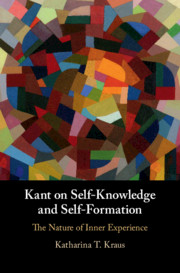Crossref Citations
This Book has been
cited by the following publications. This list is generated based on data provided by Crossref.
Gentry, Gerad
2021.
The concept of life in German Idealism and its Aristotelian roots.
Intellectual History Review,
Vol. 31,
Issue. 3,
p.
379.
Freitag, Wolfgang
and
Yolcu, Nadja-Mira
2021.
An expressivist solution to Moorean paradoxes.
Synthese,
Vol. 199,
Issue. 1-2,
p.
5001.
Cohen, Alix
2021.
Feeling, Orientation and Agency in Kant: A Response to Merritt and Eran.
Kantian Review,
Vol. 26,
Issue. 3,
p.
379.
Thielke, Peter
2021.
Kant's Prolegomena.
Sethi, Janum
2022.
Is it the Understanding or the Imagination that Synthesizes?.
Kant-Studien,
Vol. 113,
Issue. 3,
p.
535.
Gava, Gabriele
2022.
Kant on the Status of Ideas and Principles of Reason.
Open Philosophy,
Vol. 5,
Issue. 1,
p.
296.
REA, MICHAEL
2022.
The Metaphysics of the Narrative Self.
Journal of the American Philosophical Association,
Vol. 8,
Issue. 4,
p.
586.
Frierson, Patrick R.
2022.
What is the Idea of the Soul? Comments on Katharina Kraus, Kant on Self-Knowledge and Self-Formation.
Kantian Review,
Vol. 27,
Issue. 3,
p.
475.
Sethi, Janum
2022.
Subjective Validity, Self-Consciousness and Inner Experience: Comments on Kraus.
Kantian Review,
Vol. 27,
Issue. 3,
p.
461.
Rydberg, Andreas
2022.
Epistemics of the soul: Epistemic logics in German 18th‐century empirical psychology.
Journal of the History of the Behavioral Sciences,
Vol. 58,
Issue. 4,
p.
383.
Freitag, Wolfgang
and
Kraus, Katharina
2022.
An expressivist interpretation of Kant's “I think”1.
Noûs,
Vol. 56,
Issue. 1,
p.
110.
Spagnesi, Lorenzo
2022.
The Idea of God and the Empirical Investigation of Nature in Kant’s Critique of Pure Reason.
Kantian Review,
Vol. 27,
Issue. 2,
p.
279.
Longuenesse, Béatrice
2023.
Kant on Consciousness and Its Limits.
Revue de métaphysique et de morale,
Vol. N° 117,
Issue. 1,
p.
7.
Erkan, Ekin
2023.
Kant’s Metaphysics of the Self: The Self as a “Clear” Representation.
Philosophia,
Vol. 51,
Issue. 3,
p.
1201.
Hoffer, Noam
2023.
Kant's regulative essentialism and the unknowability of real essences.
European Journal of Philosophy,
Vol. 31,
Issue. 4,
p.
887.
Lorenz, Walter
2023.
Enhancing Professionality Through Reflectivity in Social and Health Care.
p.
17.
Spagnesi, Lorenzo
2023.
A rule‐based account of the regulative use of reason in Kant's Critique of Pure Reason.
European Journal of Philosophy,
Vol. 31,
Issue. 3,
p.
673.
Rodríguez Hernández, Montserrat
2023.
Personas, conciencia corporal e identidad personal en Kant.
Con-Textos Kantianos. International Journal of Philosophy,
Vol. 18,
Issue. ,
p.
89.
Thakadipuram, Thomas
2023.
Leadership Wholeness, Volume 1.
p.
29.
Havrdová, Zuzana
and
Lorenz, Walter
2023.
Enhancing Professionality Through Reflectivity in Social and Health Care.
p.
1.



